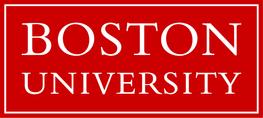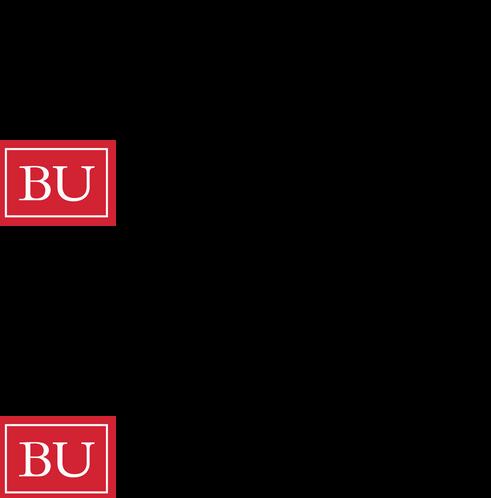














Welcome to our Season!
The School of Theatre at Boston University is delighted and honored for you to join us as we present our work to the world–all of the rehearsal hours, production meetings, technical rehearsals culminate in an experience that is not complete without you, our audience. The theatre is one of the only spaces in our lives where we gather in witness together, be it in joy, grief, curiosity, or even anger. In this, the theatre is a special space, a sacred space, and we invite your imagination to take flight with us during these performances, and hope you will return again (and again) to witness all of what makes us human as it is expressed on our stages.
With warmth and gratitude,
Kirsten Greenidge Director, BU College of Fine Arts School of Theatre


by Harold Pinter directed by Michael Kaye 4/27, 12pm • 4/29, 7:30pm
by Anton Chekhov adapted by Anya Reiss directed by Christine Hamel 4/27, 3pm • 4/30, 7:30pm
MUCH ADO ABOUT NOTHING by William Shakespeare directed by Chris Edwards and Clay Hopper 4/27, 7pm • 5/1, 7:30pm

MAX
LENNY
SAM
JOEY
TEDDY
RUTH

ASSISTANT DIRECTORS
STAGE MANAGER
COSTUME DESIGNER
FIGHT/INTIMACY
COORDINATOR
PRODUCTION ASSISTANTS
Merrik Daniel Giesen
Maia Bester
Kate Dickinson
Ricardo Castro Torres
Gavin Mariani
Aleah Sebrey
Owen Sloane
Ella Blumenthal
Victoria Pascrell
Merrik Daniel Giesen
Emma Weller
Julia Kenny
Aryan Patel
Kendall Turner

“The Homecoming”, Harold Pinter’s most famous play, is often described as a “comedy of menace.” Written in 1965, the premier performance of “The Homecoming” was produced by The Royal Shakespeare Company and directed by Peter Hall. The desire to taste power, a recurring theme in Pinter’s works, takes on a new role in this play as it delves into the dynamics within and between genders in the 1960s. In this family melodrama, the intricately woven subtext drives the narrative of six people with a deep need to repair their inner wounds left over from a damaged past.
– Michael Kaye, Director

Content warnings:
• Themes of misogyny and gender stereotypes
• Strong language including explicit sexual language and sexist slurs
• Threats of violence and murder, particularly violence against women
• References to rape, sexual slavery, and scenes of a sexual nature
• Scenes of physical violence and onstage death
• Derogatory language about sex workers
• Ableist language

TRIGORIN (BORIS) / SORIN (PETRUSHA) / DR. DORN
DR. DORN / MEDVEDENKO
ARKADINA (IRINA) / POLINA
SHAMRAYEV / MASHA
MEDDVEDENKO / SORIN (PETRUSHA) / NINA
KONSTANTIN (KOSTYA) / SHAMRAYEV
MASHA / ARKADINA (IRINA)
POLINA / TRIGORIN (BORIS)
NINA / KONSTANTIN (KOSTYA)

ASSIOCIATE DIRECTOR
STAGE MANAGER
INTIMACY DIRECTOR
LAB PRODUCTIONS COORDINATOR
PRODUCTION ASSISTANTS
Jaxon Ackerman
Jasper Bartkovich
Star Crane
Margaret Deely
Thalia Gerloff
Julien Mondjii Adlerberg
Maggie Shen
Stephanie Vaughn Serena Zhu
Shalee Mae Cole Mauleón
Carly Stegall
Gabriela Tovar-Borghini
Lauren Davis
Malia Andrews
Paul Ashton
Benjamin Mills

This semester we took a deep dive into the psychophysical acting techniques of Michael Chekhov (nephew to the playwright) and applied them to Anya Reiss’ inventive contemporary adaptation of Anton Chekhov’s ”The Seagull”. The original play - one of the first examples of psychological realism - was remarkable for its minute attention to everyday behavioral detail. Reiss takes the play in a different direction; leaving us with no set, no props, only spatial movement and text, in an adaptation that the character Konstantin might be proud of. Michael Chekhov - like Konstantin - was committed to a “theatre of the future” and hoped that the actor could provide us not only with a more insightful sense of life as it is, but also with the potential of what it could be. In this production, we hope every audience member recognizes something of themselves in one of the many actors and character types on stage, as the play asks us to question the merit of our lives and the role of art in helping to guide our life choices. By playing multiples roles, the actors are actively exploring both “who they are” and “who they could be” as they ask the same of their characters: what behavior or habits do their characters return to over and over? What do they really want, and are they capable of making a change? At its essence, ”The Seagull” gives us the opportunity to envision our lives through others’ varied temperaments: we can see ourselves reflected as we are, or as we could be, in ways that are both aspirational as well as cautionary.
– Christine Hamel, Director

Special thanks: Johnny Kontogiannis, Tasha Vogt, Ethan Vettese, Gg Martel, Mark Stanley, Katie Nelson



The Shakespearian worldview consists of three major tenets. First: People are perfectible. They never achieve perfection, but they are capable of moving toward it. Second: We find our completion in other people. We are missing puzzle pieces for which there are other people who fit. And Third, that which makes you most who you are can be your undoing.
All three are on full display in MUCH ADO ABOUT NOTHING. In world where the genders are at war, or least each not seeing possibility in the other, MUCH ADO gives us a glimpse of how we can become better, more perfect, by seeing past ourselves and into the possibility of completion in another.
– Clay Hopper and Chris Edwards, Directors





TheSchoolofTheatreatBostonUniversityCollegeofFineArtsofferseducationforthestudyofacting,stage management,design,production,andallaspectsofthetheatreprofessionwithinthesettingofamajorresearch university TheSchoolofTheatreseekstoprovidestudentswithopportunitiesforartisticgrowththrough rigorouscurriculum,professionalconnections,andanemphasisoncollaborationandnewwork Learnmore aboutthecurrentBUSchoolofTheatreproductionseasonatbu.edu/cfa/theatre/season.
Learnmoreatbuedu/cfa/theatre
Andfindusonsocialmedia@buarts,@bu schooloftheatre